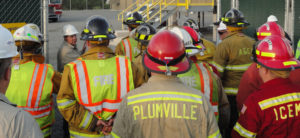
Owning and operating more than 3,000 miles of pipeline in Pennsylvania comes with tremendous responsibility, and safety — of our people, our communities and the environment — is always top priority. Throughout the year, Energy Transfer sponsors Paradigm Coordinated Response Exercise (CoRE) training sessions to educate first responders and other stakeholders about natural gas and petroleum pipeline safety and how to react in the event of an incident. Last year, Energy Transfer sponsored 21 CoRE training sessions across Pennsylvania for 2,027 attendees, who included emergency officials, public officials and excavators.
CoRE is designed to bring together pipeline operators and first responders so they can pre-plan for pipeline emergency response. Starting from basic safety initiatives and the hazards and characteristics of various pipeline products and systems, trainees learn the specifics of the Pennsylvania One Call System, or Pennsylvania 811, which helps to prevent damage to underground facilities and can also serve as a resource to emergency responders during an incident.
Every CoRE session is based on local pipeline incident scenarios that are designed to encourage an open dialogue between the agencies and pipeline operators, engaging all attendees in a simulated response scenario. The program is organized into three blocks that address and re-create three crucial stages in effectively responding to a pipeline incident: (1) initial call and assessment, (2) on-scene response and (3) managing media communications. Each block includes talking points for various pipeline scenarios and product types, emergency response and securing the scene after an incident.
In addition to CoRE training, Energy Transfer’s Mariner Emergency Response Outreach (MERO) program focuses on incident response planning for natural gas incidents. To date, 1,950 Pennsylvania first responders have been trained through the MERO program.
To get notified of future Mariner East updates, subscribe here.
